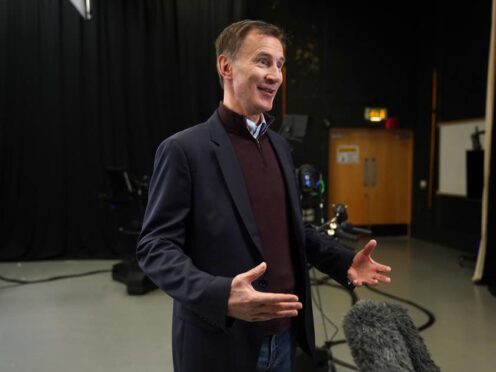Jeremy Hunt claimed Labour’s economic policy is a “black hole filled with platitudes”, as he faced calls to explain how scrapping national insurance would be funded.
The Chancellor also questioned where the Opposition would find “literally billions of pounds to fund unfunded spending pledges” on the NHS and decarbonisation as he faced Rachel Reeves at Treasury questions.
Mr Hunt used his budget to announce his ambition to scrap national insurance, prompting Labour warnings that it would create a “£46 billion hole” in funding earmarked for the state pension and NHS.

Shadow chancellor Ms Reeves told he Commons: “After the Budget the Chancellor wrote to Conservative Party members telling them that the Government planned to abolish national insurance.
“The Economic Secretary said that national insurance will vanish and the Prime Minister said it was his ambition to abolish it.
“So can the Chancellor confirm whether he asked the Office for Budget Responsibility (OBR) to cost the Government’s unfunded plan to abolish national insurance contributions?”
Mr Hunt replied: “I’m very glad that she asked about national insurance cuts because first she supported them, then she abstained in the lobbies, and now she appears to be against them; like the bankers’ bonus tax which she was strongly in favour of and then strongly against, like £28 billion of borrowing she was strongly in favour of and then strongly against.
“Isn’t the actual truth here that where Labour should have an economic policy, there is just a black hole filled with platitudes?”
Ms Reeves countered: “The Chancellor did not even attempt to answer the question.
“But the chair of the OBR told the Treasury committee the week after the Budget that it was not a measure given to us to cost.
“Even the Chancellor’s predecessor, who was sacked for his own kamikaze budget, said: ‘If you’re going to reduce taxes you have to show at least partially where the money is going to come from.’
“So can I ask the Chancellor: where will the money come from? Will it come from cuts to the NHS, the state pension and public services? Will it come from increasing taxes, including for pensioners, or will it come from increasing borrowing? Which one, Chancellor?”
Mr Hunt dismissed suggestions it was a “mini-budget black hole”, adding: “We specifically said we wouldn’t fund national insurance cuts from increasing borrowing or cutting spending on public services.”
Ms Reeves could be heard saying: “So, higher taxes then?”

Mr Hunt went on: “If she wants to put on the mantle of fiscal rectitude, where is Labour going to find literally billions of pounds to fund unfunded spending pledges on grid decarbonisation, NHS waiting lists?
“We all know what that will lead to: higher taxes, like every Labour government in history.”
Mr Hunt earlier also told MPs: “The most recent data suggest that despite a tough couple of years caused by the pandemic and energy crisis, living standards will return to their pre-Covid peak next year – a full two years earlier than originally predicted by the OBR, they have risen by £1,700-a-household in real terms since 2010, and this year’s cut in national insurance will increase living standards by 1%.”
The Chancellor, pressed on when interest rates will fall, also said: “The Office for Budget Responsibility predicted at the Budget that inflation would fall to around target in the next few months, and that gives the best possible prospect of interest rates starting to fall.”
Elsewhere in Treasury questions, Conservative former minister Dame Andrea Jenkyns pressed for more money to be allocated to help pensioners.
She said: “I welcome the recent tax cuts. Now we need to ensure that those who work hard and do the right thing are rewarded in their old age.
“Minister, can the Treasury please stop allocating funds to France – who are clearly not stopping the boats – and stop extortionate amounts being spent on hotels for illegal migrants and reduce the foreign aid budget? Then maybe we can give even more to our pensioners.”
Treasury minister Nigel Huddleston replied: “(Dame Andrea) will be well aware that on this side of the House we are doing and implementing measures to tackle the very problems that she has outlined whilst also turning the corner in the economy and doing everything we can to put more money back in people’s pockets.”
Conservative MP Nickie Aiken (Cities of London and Westminster) called for a “full independent review” of the Treasury’s data on tax-free shopping for tourists.
Conservative former minister Ranil Jayawardena said Sweden enjoyed a “boom in entrepreneurship, economic and higher tax revenues” after it abolished inheritance tax, as he asked ministers to meet him to discuss the matter further.
